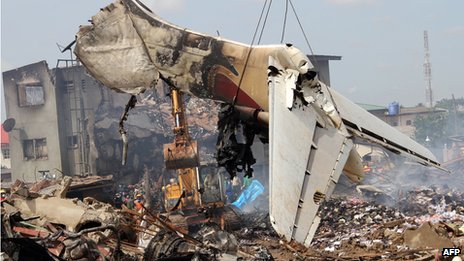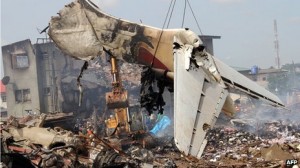By Adaobi Tricia Nwaubani

Throughout her childhood, Uche Anuligo’s family travelled back to their ancestral home for Christmas and New Year. Every year, father, mother and six children, including Uche, embarked on the nine-hour road journey from Kano to Anambra.
“But my family never travelled together,” Uche, now a banker in Abuja, told me. “We usually went in about four different cars, and left a day or two apart.”
She said that her father thought long and hard about who should travel in which car. He wanted to ensure that if tragedy struck, the loss to the family would be “minimal”. So his wife and eldest son were never in the same vehicle. And her father would travel alone with only the housekeeper for company. Whatever happened, there would always be at least one parent or the eldest son left to head the family.
Travelling in Nigeria has always been treacherous.
Violent crime is widespread, roads are pot-holed and public transport is chaotic. And air travel can result in tragedy.
Maimuna Anyene and her children had made their home in the USA. They had all returned to Nigeria to visit her husband, who still lives here, and to attend her brother’s wedding. She boarded the Dana Air plane with her husband, their four children and her mother.
On the same flight was Ogechi Onyeaguocha. She had recently moved, because of work, from Abuja to Lagos several weeks ago. She had travelled back to collect her nine-year old daughter, Chidinma, who had been staying with her father. The child was going to attend a new school in Lagos and she needed to sit the entrance exams.
Five minutes before landing, the plane that Maimuna and Ogechi had boarded less than an hour earlier, crashed into a residential area in Iju, just outside Lagos. All 153 people on board perished.
Ogechi was my friend’s cousin. Maimuna was my sister’s friend.
The first thing my sister remembered, when she heard the news, was Maimuna’s Facebook page.
Because people she knew in the US were concerned about her returning to Nigeria – probably because of the Boko Haram bombs that have caused so much devastation – Maimuna had posted:
“…My darling friends, cool down. Just going for Ndoka’s wedding … I’ll be back. Have some faith in Naija [Nigeria]…”
People also died on the ground. Many were in their homes on Sunday afternoon, minding their own business, when the plane struggling to stay in the air, narrowly missed a hospital building, struck an electric pole, and then smashed into their houses.
The Lagos government has taken into its care three children whose home was one of those reduced to rubble.
They were found roaming the neighbourhood, unable to locate their parents. According to news reports, the children had been sent out on an errand shortly before the plane crashed. It was this that saved their lives.
The last time Nigeria experienced an air disaster of this scale was in October 2006, when an Abuja to Sokoto ADC aircraft crash landed, killing 96 people, including the Sultan of Sokoto, spiritual leader of Nigeria’s Muslims, and his son.
Uzoma Okoronkwo’s brother, Enyinnaya, was also on that flight.
She heard the news of the crash on her car radio, while returning from church that Sunday morning. “It took me five years after that before I could board a local flight,” the Lagos business executive told me. The first time she finally did was last November.
My sister’s friend Maimuna will never return to the USA. And as her Facebook page suggests – you can never be prepared for the random hazards Nigeria will throw at you.
Maimuna told her online friends to have faith. Perhaps that is the best you can hope for.
A text message has been circulating since the crash.
It sums up the country’s recent tragedies and the bleak mood of its people:
“You travel by road, a petrol tanker catches fire. By air, plane crashes.
“You sit in your house, the plane comes to meet you. You go to church, Boko Haram attacks you. You go by sea, militants attack you. You finally run to your village, you are kidnapped. Is there any safe place in Nigeria?”


